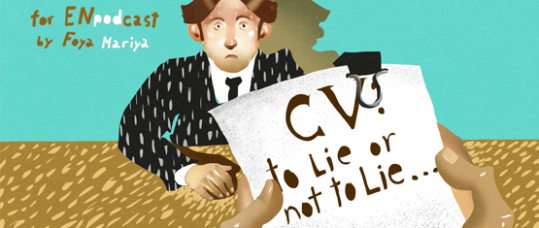CV: to Lie or not to Lie?
Nowadays it's rather hard to get a job without writing a good CV. And sometimes it's even harder to get it without lying about it. Surveys show some really surprising numbers about “CV liars” – more than half of job applicants in the USA misrepresent some information in their CV (according to the US Society of Human Resources and Management studies).
The most common things to lie about are, firstly, the dates of employment – candidates usually try to avoid some gaps in their employment history and stretch the real dates. Secondly, the skills that the applicants have are often enhanced in the way that doesn't correspond to reality. And thirdly, some of the job seekers tend to fake references, job titles and even education – unfortunately, there are plenty of websites which offer the faking service for some fee. Everybody can realize the serious consequences of faking credentials and references. But these websites still exist; so, whether is demand, there will be supply. Luckily, not every job hunter is risky enough to use those services. Instead, many prefer so called “white lies” – as exaggerating skills or periods of employment.
At the first glance – nothing bad can happen if these tiny lies improve the general impression of your CV or even if they get you a job. Although in some cases they can lead you through the first round of job interviews, but when it comes to shortlisting – your skills, references and other details may be examined more carefully and then you can make a complete fool of yourself. Don't forget, that employees in HR have the necessary qualifications (well, that's if they haven't lied on their CVs:) and they hold thousands of job interviews and meet thousands of candidates. They are trained to find the right people and, besides, they are often good psychologists. So, even if you are really lucky and nobody finds out about those innocent lies that you have told and you finally get the desired position, you still won't be able to sigh with relief. Why? Well, when you start lying you need to realize that you'll have to do it forever. Once you started playing this game – get ready for a long unfair play and prepare yourself for additional stress at work. Later on you'll often worry that colleagues or the boss can find out something that can easily spoil your reputation within the company or that you might not have enough experience or qualifications to perform some tasks. You can find yourself in a situation when you don't meet deadlines, underperform, don't get a promotion or pay rise and, eventually, you will hate your job.
So, it's up to you to decide – to lie or not to lie on your CV. Maybe next time instead of googling for “effective ways to lie on your CV”, try “honest and effective strategies for CVs” – some of them are really useful. Remember, that by lying about your past you jeopardize your future.
















